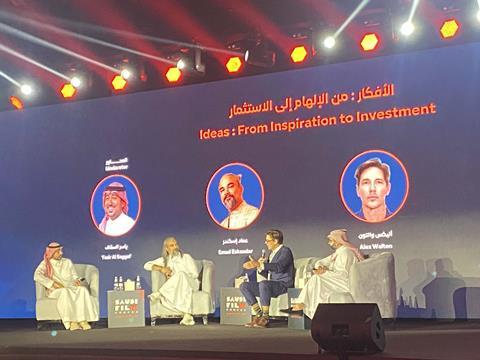
The challenge facing filmmakers in securing finance from Saudi banks was a key talking point of a Saudi Film Confex panel this week on investment in movies.
Faisal Darwish, head of Institutional banking at leading Saudi bank Banque Saudi Fransi (BSF), acknowledged the difficulty in getting the film industry and the banking sector to align their respective interests.
The Saudi film industry has been developing at breakneck speed since 2018 when the first cinemas started to open in the country after a 35-year ban. But accessing film finance from traditional banks has often proved a challenge, both for local and international filmmakers looking to film in the country.
Darwish noted that the culture and entertainment were identified as strategic growth sector in Saudi Arabia by the Kingdom’s Vision 2030 initiative. “So it’s our role as banks to support these initiatives and help develop them.”
But Darwish noted that film financing “doesn’t really fall into the typical corporate financing structure” that banks are used to.
“It is not easy. It is difficult,” he said. “We have to think differently. We have to be a bit more creative. We look at things like cash flow, we want revenue. It is a completely different risk profile. So structuring it I think will take some work. We have to look at things like, Are there streaming contracts behind it? Is there is a distribution agreement? Those sort of things will give us comfort. The more we get exposed to it the more we understand this business. “
Darwish said one way for filmmakers to provide comfort to risk averse banks is evidence of guaranteed revenues down the line. Pre-sales or distribution deals “will give us comfort because we know there’s money coming in that can pay the interest payments and eventually the principle [loan].”
Darwish said that banks like BSF worked closely with Saudi organisations such as the Red Sea Fund, the Saudi Film Commission and Saudi Cultural Development Fund (CDF) to help guide it.
Speaking on the same panel, the head of the Red Sea Film Fund, Emad Eskander, noted the importance of its backing for enabling local, Middle East and African projects. Red Sea supported five films that played at the Venice Film Festival this year, including Saudi director Shahad Ameen’s acclaimed drama Hijra.
One of the main impacts that Red Sea funding provides is confidence to filmmaker teams, said Eskander. “It’s a human behaviour. Once I like your idea, once I put my money on your idea, you feel more confident. You know this is serious, this is happening.”
The backing of a recognised fund with a track record of international festival success like Red Sea also gives credibility to projects, helping them to secure further finance said Eskander.
Asked what attracts investors to specific film projects, Alex Walton, the co-head WME Independent, the agency’s independent film sales and financing department, said that in his experience “80+% of people are probably looking for something that they fall in love with. Sometimes those people are falling in love with the possible earnings or the possible profit but largely every investor that we work with has a different taste and they’re trying to find stories that match their tastes and match their interests.”
Data becomes more important when selling a film, mainly when dealing with big streamers. “They will not make a decision without data,” said Walton.
The Saudi Film Confex is taking place in Riyadh from October 22-25.

























No comments yet